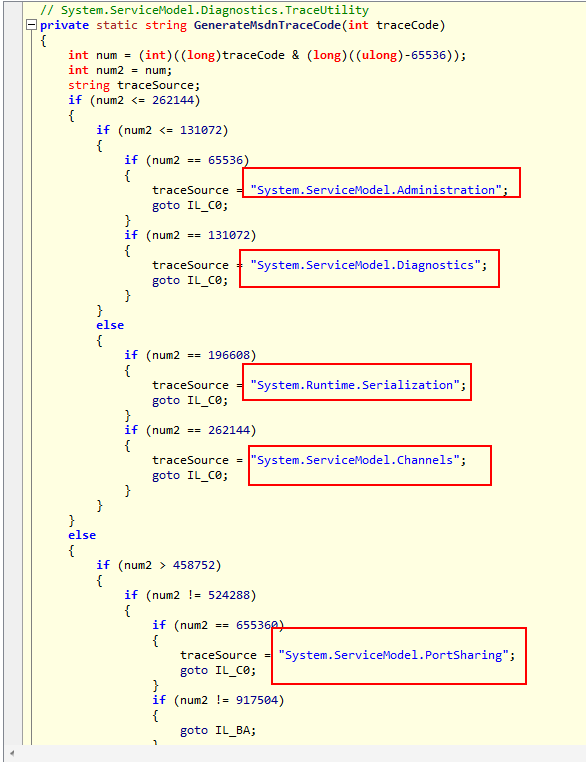經常搞wcf的基友們肯定會知道,當你的應用程式有很多的“服務引用”的時候,是不是有一種瘋狂的感覺。。。從一個環境遷移到另外一個環境,你需要改變的
endpoint會超級tmd的多,簡直就是搞死了人。。。好了,這篇我們來看看如何最小化配置。
一:精簡service的config配置
就像上一篇的程式碼一樣,我的service端的config配置如下:
1 <?xml version="1.0" encoding="utf-8" ?> 2 <configuration> 3 <system.servicemodel> 4 <behaviors> 5 <servicebehaviors> 6 <behavior name="mxbehavior"> 7 <servicemetadata httpgetenabled="true" /> 8 <servicedebug includeexceptiondetailinfaults="true" /> 9 </behavior> 10 </servicebehaviors> 11 </behaviors> 12 <services> 13 <service name="myservice.homeservice" behaviorconfiguration="mxbehavior"> 14 <endpoint address="net.tcp://localhost:1920/homeservice" binding="nettcpbinding" contract="myservice.ihomeservice"> 15 <identity> 16 <dns value="localhost" /> 17 </identity> 18 </endpoint> 19 <endpoint address="mex" binding="mexhttpbinding" contract="imetadataexchange" /> 20 <host> 21 <baseaddresses> 22 <add baseaddress="http://localhost:19200/homeservice"/> 23 </baseaddresses> 24 </host> 25 </service> 26 </services> 27 </system.servicemodel> 28 </configuration>
通過上面的程式碼,你應該知道在system.servicemodel下的所有節點都是wcf專屬的節點,所有的節點資料都會被開啟servicehost這個監聽器時捕獲到,下面我可以
通過servicehost這個監聽器的原始碼下面找找相關的讀取config節點的程式碼。

通過上面的截圖,你是不是有一種感覺,就是service的底層也是通過程式碼動態的讀取config下面的節點來獲取資料,那就意味著我可以直接將程式碼寫入到code中,
對吧,這樣我就可以把我認為該配置的東西配置起來,不該配置的東西全部放到程式碼裡面去,這樣我的靈活性是不是非常的強大。。。。爽吧,說幹就幹。。。
1 class Program1 2 { 3 static void Main(string[] args) 4 { 5 ServiceHost host = new ServiceHost(typeof(HomeService), new Uri("http://localhost:19200/HomeService")); 6 7 host.AddServiceEndpoint(typeof(IHomeService), new NetTcpBinding(), "net.tcp://localhost:1920/HomeService"); 8 9 //公佈後設資料 10 host.Description.Behaviors.Add(new ServiceMetadataBehavior() { HttpGetEnabled = true }); 11 host.AddServiceEndpoint(typeof(IMetadataExchange), MetadataExchangeBindings.CreateMexHttpBinding(), "mex"); 12 13 host.Open(); 14 15 Console.WriteLine("服務已經開啟。。。"); 16 17 Console.Read(); 18 } 19 }
有人就要說了,地址的話肯定不能是寫死的,必須變活,簡單啊,我就僅僅把ip地址配置到config裡面去不就完事了,對不對。
<configuration> <appSettings> <add key ="baseurl" value="http://localhost:19200/HomeService"/> <add key ="endpoindurl" value="net.tcp://localhost:1920/HomeService"/> </appSettings>
1 class Program1 2 { 3 static void Main(string[] args) 4 { 5 ServiceHost host = new ServiceHost(typeof(HomeService), new Uri(ConfigurationManager.AppSettings["baseurl"])); 6 7 host.AddServiceEndpoint(typeof(IHomeService), new NetTcpBinding(), ConfigurationManager.AppSettings["endpoindurl"]); 8 9 //公佈後設資料 10 host.Description.Behaviors.Add(new ServiceMetadataBehavior() { HttpGetEnabled = true }); 11 host.AddServiceEndpoint(typeof(IMetadataExchange), MetadataExchangeBindings.CreateMexHttpBinding(), "mex"); 12 13 host.Open(); 14 15 Console.WriteLine("服務已經開啟。。。"); 16 17 Console.Read(); 18 } 19 }
現在看的話,是不是清楚多了,如果你覺得我的程式碼比較累贅,你可以封裝成一個方法,然後就可以動態的配置nettcp,basic,ws*等等對吧。。。好了,說完服
務端,接下來我們看看client端如何避免。
二:精簡client的config配置
就像上一節那樣,如果我用“服務引用”的話,vs會偷偷的用svcutil.exe來給我們生成一個proxy類和一個config檔案,proxy類也就是你看到的xxxclient。。。
可惡的是config裡面會給我生成一些亂七八糟的東西,如下圖:
1 <?xml version="1.0" encoding="utf-8" ?> 2 <configuration> 3 <system.serviceModel> 4 <bindings> 5 <netTcpBinding> 6 <binding name="NetTcpBinding_IHomeService" /> 7 </netTcpBinding> 8 </bindings> 9 <client> 10 <endpoint address="net.tcp://localhost:1920/HomeService" binding="netTcpBinding" 11 bindingConfiguration="NetTcpBinding_IHomeService" contract="HomeServiceReference.IHomeService" 12 name="NetTcpBinding_IHomeService"> 13 <identity> 14 <dns value="localhost" /> 15 </identity> 16 </endpoint> 17 </client> 18 </system.serviceModel> 19 </configuration>
同伺服器端一樣,如果我用code做掉,是不是非常的爽呢???那可不可以做掉呢? 我們還得看一下proxy的原始碼,首先你會看到其實所謂的proxy只是一個繼承
自clientbase的一個類,如下圖。


上面的兩幅圖,你會發現,最後的proxy類是通過ChannelFactory<TChannel>類來完成助攻的,那話說回來了,既然底層用了ChannelFactory<TChannel>,
那何不我在程式碼裡面就用ChannelFactory<TChannel>不是更好嗎???這樣config也省了,對吧,說幹就幹啦。。。
1 static void Main(string[] args) 2 { 3 ChannelFactory<IHomeService> factory = new ChannelFactory<IHomeService>(new NetTcpBinding(), "net.tcp://localhost:1920/homeservice"); 4 5 var channel = factory.CreateChannel(); 6 7 var result = channel.GetLength("12345"); 8 }
好了,程式碼就這麼簡單,現在是不是感覺自己萌萌大啦~~~